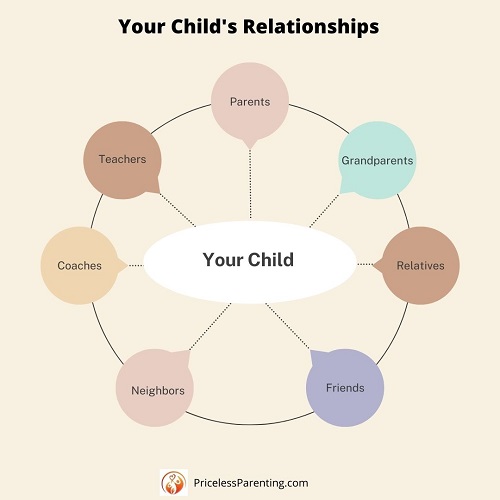Developing Relationship Skills Needed to Succeed
by Kathy Slattengren, M. Ed., Priceless Parenting (sign up for monthly parenting newsletter and receive 20+ printable charts for kids and parents)

Are your kids developing the relationship skills they need to succeed? Building and maintaining relationships is essential for your kids’ success and happiness.
Are relationship skills easy to learn? No! It takes a lot of practice with many different people and situations.
How important are relationship skills? They are vital to your child’s success and wellbeing. Your kids are more likely to excel in school and other activities when they have strong interpersonal skills.
Building a Strong Relationship Foundation
Your relationship with your child is the foundation on which they will build all other relationships. No matter what your children’s ages, you can strengthen your relationship by spending more time with them.
Join your children in things they like doing. It might be building with Legos, playing with dolls, playing catch, swinging, biking, or jumping on a trampoline. When you participate in activities your children enjoy, you send a strong message about how much you love them and want to be with them. Be sure to choose activities that don’t involve screens. While video games and shows are something you both may enjoy, they do not involve enough face-to-face time.
Now you may not really like playing with dolls or shooting baskets. That’s not the point. You do these activities to be closer to your children by doing something they enjoy. Spending 10 minutes a day fully engaged in an activity with your child will strengthen your relationship.
Signs of Needing to Improve Relationship Skills
Developing social skills is like learning a language or a physical skill, it takes a lot of repetition. For a variety of reasons, most kids have significantly less relationship time than the previous generation.
What are some signs that your child needs more time interacting with others?
- Your child is not good at sharing with other kids.
- Even when friends come over, your child prefers watching TV or being on a digital device to playing with friends.
- Your child struggles to make and keep friends.
- Your child likes to be in charge and is reluctant to listen to others.
- Your child acts inappropriately in many social situations.
If you feel your children lack social skills appropriate for their age, they need more opportunities for practice. They may prefer being alone or playing on their digital devices, however, those activities do not build social skills.
Programs designed to help children with autism can provide insight on developing relationship skills.
Raun Kaufman’s book,
Autism Breakthrough: The Groundbreaking Method That Has Helped Families All Over the World,
describes the Son-Rise program provided at the Autism Treatment Center of America. This program is based on what Kaufman’s parents did to help him when he was a toddler diagnosed with severe autism and an IQ of 30.
While the experts in the late 1970’s provided little hope for Kaufman, his parents saw his most fundamental issue was with social skills. They worked tirelessly on building their relationship with him by joining him in his activities like repetitively spinning plates and rocking. Eventually their relationship built the bridge he needed to join them in their world instead of retreating into his own world.
Kaufman describes how the Son-Rise approach is different. "First, we want to change the question we ask ourselves when seeking to help our child. Instead of asking, "What do I need to do in order to change my child's behavior?" we want to ask, "What do I need to do in order to create a relationship with my child?" Once we ask this question, everything changes. Our whole approach shifts."
He goes on to explain why creating the relationship is the key to everything. Children’s behavior is always serving a purpose. Forcefully trying to stop a behavior causes more problems than it solves. By building the relationship, the troublesome behaviors eventually melt away on their own.
Developing Relationship Skills
Kids need lots of time with loving adults and other children to develop their social skills. Your children learn from your behavior. When you hold and comfort them when they are crying, you are sharing your calmness with them. When you get frustrated and yell at them, they are also learning from your response.
Developing relationship skills is a lifelong endeavor. Some of the basic skills your kids need are:
- Communication – letting others know your needs and desires
- Listening – understanding what others are communicating to you
- Emotional Regulation – handling challenges without exploding or withdrawing
- Conflict Resolution – being able to peacefully resolve differences with others
- Empathy – being aware of others’ feelings and showing you care
- Sharing – willingness to be generous to others
You can help your children develop their social skills by giving them plenty of opportunities to interact with family, friends, and other adults. When problems occur, help your children understand what happened and what they may want to do differently in the future. It’s only by participating in relationships that your children learn the intricacies of making them work.